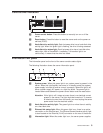
Server features
The unique design of the server takes advantage of advancements in symmetric
multiprocessing (SMP), data storage, and memory management. The server
combines:
v Impressive performance using an innovative approach to SMP
The server supports up to four Pentium III Xeon processors. The server comes
with at least one processor installed; you can install additional processors to
enhance performance and provide SMP capability.
v Large data-storage and hot-swap capabilities
All models of the server support up to three standard and three optional 26 mm
(1-inch) slim-high 3.5-inch hot-swap hard disk drives in the hot-swap bays. This
hot-swap feature enables you to remove and replace hard disk drives without
turning off the server.
v Active PCI (hot-plug) adapter capabilities
The server has six hot-plug slots for PCI adapters. With operating system
support, you can replace failing hot-plug PCI adapters without turning off the
server. If the hot-add feature is supported by the operating system and the PCI
adapter, you can also add PCI adapters in these slots without turning off the
server.
v Redundant cooling and power capabilities
The redundant cooling and hot-swap capabilities of the fans in the server enable
continued operation if one of the fans fails. You can also replace a failing fan
without turning off the server.
The server comes standard with one 270-watt power supply. Install three
270-watt power supplies to ensure redundancy and hot-swap capability for a
typical configuration. (See “Installing a hot-swap power supply” on page 70 for
instructions.)
v 100 MHz front-side bus (FSB)
The FSB is the processor external bus. This bus is the interface between the
processors and the system board. The FSB is also known as the processor/host
bus.
v Large system memory
The memory bus in the server supports up to 16 GB of system memory. The
memory controller provides error correcting code (ECC) support for up to 16
industry-standard, 3.3 V, 168-pin, 8-byte, PCI, PC100 registered, dual inline
memory modules (DIMMs). The memory controller also provides Chipkill
™
memory protection. Chipkill memory protection is a technology that protects the
system from a single chip failure on a DIMM.
v System-management capabilities
The server comes with an Advanced System Management Processor on the
system board. This processor enables you to manage the functions of the server
locally and remotely. The Advanced System Management Processor also
provides system monitoring, event recording, and dial-out alert capability.
Note: The Advanced System Management Processor is sometimes referred to
as the service processor.
v Integrated network environment support
The server comes with an Ethernet controller on the system board. This Ethernet
controller has an interface for connecting to 10-Mbps or 100-Mbps networks. The
server automatically selects between 10BASE-T and 100BASE-TX. The controller
General information 5


















